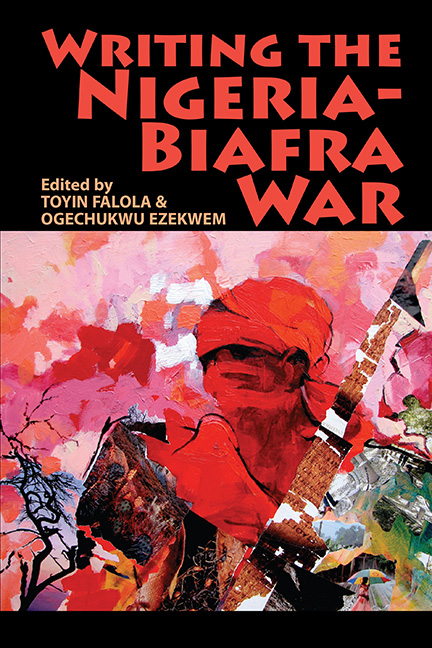Book contents
- Frontmatter
- Contents
- Notes on Contributors
- List of Abbreviations
- Timeline
- Map of Biafra 30 May 1967 – 1 May 1969
- 1 Scholarly Trends, Issues, and Themes: Introduction
- Part I On The History Of The Nigeria-Biafra War
- Part II Critical Debates On The Nigerian Crisis
- Part III The War In Fiction, Memoir, And Imagination
- Part IV Locating Gender In Nigeria-Biafra War Literature
- Select Bibliography
- Index
9 - Local Writers and Commitments to Ethnic Sentiments
Published online by Cambridge University Press: 17 June 2021
- Frontmatter
- Contents
- Notes on Contributors
- List of Abbreviations
- Timeline
- Map of Biafra 30 May 1967 – 1 May 1969
- 1 Scholarly Trends, Issues, and Themes: Introduction
- Part I On The History Of The Nigeria-Biafra War
- Part II Critical Debates On The Nigerian Crisis
- Part III The War In Fiction, Memoir, And Imagination
- Part IV Locating Gender In Nigeria-Biafra War Literature
- Select Bibliography
- Index
Summary
Introduction
Between 1970, when the Nigerian Civil War ended, and today, there has been (and continues to be) a plethora of publications that seek to understand and explain this dark moment in the history of the nation. Two distinct groups can be discerned: the academic and non-academic. Within these two broad groups lie various genres of writings on the civil war. In the academic group, writings critically examine the causes as well as the effects of the civil war, and they draw conclusions to serve as lessons for the future.
In the non-academic category, four main genres of writings can be identified. The first are novels and stories. These works of fiction have invented characters who narrate their viewpoints of the events surrounding the emergence and prosecution of the civil war. The second genre encompasses memoirs and personal accounts in which authors seek to present their work empirically, having experienced, witnessed, and/or participated in the prosecution and resolution of the war. The third genre is social media writings – including blogs and opinion pieces as well as feature articles in newspapers and magazines. Social media has blossomed in the last few years as a result of the combination of renewed interest in the story of Nigeria by a younger generation as well as rapid advances in information technology. The final type of work in this genre, following the popularity of documentaries and full length motion pictures, consist of theatrical/movie scripts on which plays as well as movies about the war are based.
It is important to state at the outset that although most of the works within the non-academic category are fictional in nature, they do not depart in their accounts from the various propositions made by the materials that fall within the academic literature of the war. Chimamanda Adichie and K. Okpi are a good example of the crossover between fact and fiction. In Okpi's words, ‘some of the characters and events … are fictional, some are not. Its background, however, is a matter of historical records … and [the] fictionalised telling is an honest reflection of [the] civil war.’
The objective of this chapter is to address two questions in relation to the existing literature by local authors on the Nigerian Civil War.
- Type
- Chapter
- Information
- Writing the Nigeria-Biafra War , pp. 194 - 206Publisher: Boydell & BrewerPrint publication year: 2016



